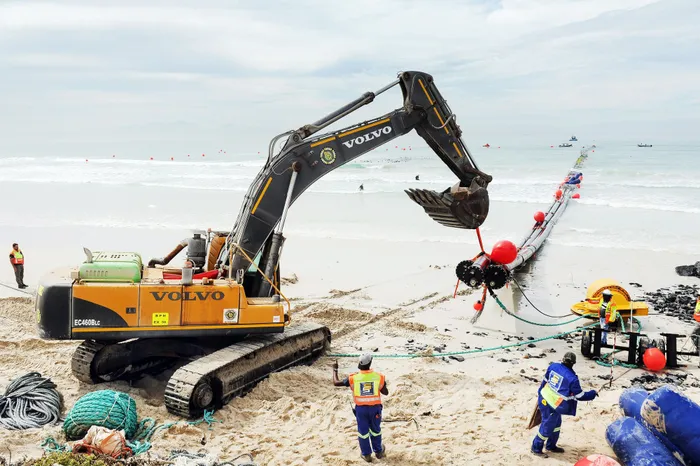#EveryDropCounts: Two multimillion-rand desalination plants have stopped working

ALMOST ON STREAM: Engineers move large pipes into place with the help of excavators and tugboats at the Strandfontein Pavilion desalination site. File picture: Henk Kruger/African News Agency (ANA) ALMOST ON STREAM: Engineers move large pipes into place with the help of excavators and tugboats at the Strandfontein Pavilion desalination site. File picture: Henk Kruger/African News Agency (ANA)
Cape Town - Two multimillion-rand desalination plants built to help avert a now forgotten Day Zero scenario have stopped working.
City mayoral committee member for water waste services and energy Xanthea Limberg said both the Strandfontein and Monwabisi temporary desalination plants are unable to produce water without causing damage to the sensitive membrane filtration systems when the sea water is highly turbid or contains large numbers of algal cells, such as in the case of the recent natural algal bloom in False Bay.
“The Strandfontein plant was not producing water over the period November 1 to 7 and the Monwabisi plant was operating normally for only three days during the same period. Both plants again stopped producing drinking water on November 16 due to the recent algal bloom. Water production at the desalination plants will be restarted once the algal bloom dissipates,” Limberg said.
She noted that she had never confirmed that both plants were operating at full capacity, merely that they were operational.
“Periods of lower production of water are to be expected,” she said.
The two plants were expected to deliver 7 million litres of waters a day and came at a cost of just more than R250 million each.
Members of civic group STOP COCT visited the two sites on Thursday.
Led by the group’s founder Sandra Dickson, they found workers digging holes and planting poles outside the gate at the Strandfontein site.
“The (Strandfontein) plant was silent and non-operational. If the plant is operational, water from the sea can be seen entering the plant in the high towers clearly visible from the sea on the outside. This was not the case. We asked around and various people working around the pavilion told us that the plant was not operational for the past month,” Dickson said.
She said they had noticed the City’s water report had shown a drop in the production of augmented water.
“We find this alarming, because what would have happened if we were still in a drought situation and people’s lives depended on these desalination plants delivering clean drinking water? The City paid out a large sum of money which is reflected in the exorbitant water tariffs since February 1.
“The 13500 members of STOP COCT and the wider public feel cheated as they are burdened with extreme water tariffs, but nothing in terms of water security is delivered,” she said.
On December 1, the City relaxed its water restrictions from level 5 to level 3. With the drop in restrictions, the City also decreased its tariffs, which is to be reflected in accounts this month.
Consumers can now use 105 litres per person a day, and several other rules were relaxed. As soon as restrictions were dropped, water consumption increased. Last week, the City’s dam levels were at an average 70.3% storage capacity.
@JasonFelix
jason.felix@inl.co.za
Cape Argus
Related Topics: